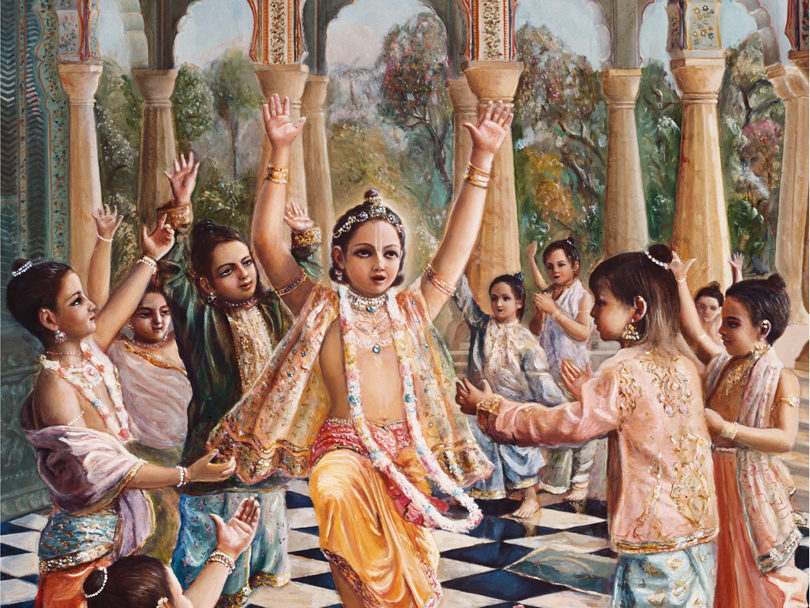
I do not know whether you have got experience. In India there are several old wells on the paddy fields and they are covered with grass. Nobody can understand that there is a well underneath this, underneath this grass. And if by mistake one comes there, he falls down, say hundred feet down. And it is covered with grass. Even if he cries, "Please save me, save me," who is going to save him? Sometimes cow and animals and men fall down in that way. If he's fortunate enough, somebody comes and rescues. Otherwise, generally, there is no rescue. Who is going to know that there is a man or there is an animal? So hitvātmā-ghāṭam andha-kūpaṁ. This material world is just like that blind well. If somebody falls down in it, it is very difficult to get out of it. Therefore it is ātmā-ghāṭam. Ātma-ghāṭam means killing the soul. How we are killing the soul? We forget that "I am spirit soul." Therefore almost every one of us is forgetful that "I am spirit soul. I am identifying with this body." And Prahlāda Mahārāja says, because we have identified with this body, therefore we are always anxious, full of anxieties. And that is the fact
Therefore the whole process of knowledge is... I think some of my student, she is present here. She asked me, "What is knowledge?" The knowledge is that "I am not this body." This is knowledge. Knowledge does not mean that how you can manufacture nuclear weapon. That is not knowledge. That is illusion. Real knowledge is to know the simple fact that "I am not this body." That's all. But that knowledge is very rare. And to acquire that knowledge, there are so many systems. That system is called self-realization. There is yoga system, there is jñāna system, jñāna-yoga, dhyāna-yoga, karma-yoga. There are so many yoga systems simply to come to the platform of this knowledge that "I am not this body." And as soon as one comes to this platform that "I am not this body," then what happens to him? Brahma-bhūtaḥ, self-realization. And what is that self-realization? What is the symptom? How I can understand that one is self-realized? Prasannātmā. He's jolly. (laughter) The... So long we do not come to that platform of knowledge, we are full of anxieties. And as soon as we come to the platform of knowledge that "I am not this body," the immediate symptom is joyfulness, prasannātmā.
How that prasannātmā is manifested? Everything is there. Na śocati na kāṅkṣati. Śocati means lamentation, and kāṅkṣati means hankering. These two things will disappear. Śocati, if we lose something, then we lament, "Oh, I have lost so much money. I have lost my son. I have lost my service," and so many things. And kāṅkṣati, kāṅkṣati means, "I haven't got this; I want this; I haven't got this." These two kinds of diseases makes us always full of anxieties. Why you are anxious? For these two things, Śocati and kāṅkṣati. Lamentation for the loss and hankering after which we do not possess. Prahlāda Mahārāja says that if somebody wants to get free from this anxiety... And this anxiety is due to asad-grahāt. Asad-grahāt means for accepting this temporary body. Asat. Asat means temporary, that will not exist. So Prahlāda Mahārāja suggests the remedy that if anyone wants to get free from anxieties... Because the anxiety is sure and certain for everyone who has got this material body. But if he wants to get free from it, then hitvātma-ghāṭam gṛham andha-kūpaṁ, the so-called atmosphere of material happiness, he should give up, and vanaṁ gato yad dharim āśrayeta [SB 7.5.5], and go to the forest and accept the lotus feet of Hari, or the Supreme Personality of Godhead. The same instruction is everywhere. In the Bhagavad-gītā also the same instruction is there: sarva-dharmān parityajya mām ekaṁ śaraṇaṁ vraja [Bg. 18.66]. The one word is that unless and until we take shelter of the lotus feet of the Supreme Personality of Godhead, there is no, I mean to say, possibility of our getting free from the anxiety of material existence.
Śrīmad-Bhāgavatam 7.9.8 — Montreal, July 1, 1968

